

Climate change: EU aims to be 'climate neutral' by 2050. Image copyright Getty Images The European Union says it is aiming to become the first major economy to go "climate neutral" by 2050.
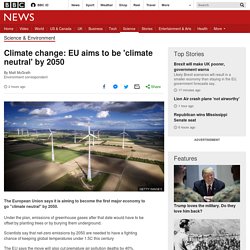
Under the plan, emissions of greenhouse gases after that date would have to be offset by planting trees or by burying them underground. Scientists say that net-zero emissions by 2050 are needed to have a fighting chance of keeping global temperatures under 1.5C this century. Summary of Solutions by Overall Rank. Higher temperatures linked to EU asylum figures. Image copyright Getty Images Sharp increases in the numbers of those seeking asylum in the European Union have been linked to higher temperatures in agricultural regions of the world.
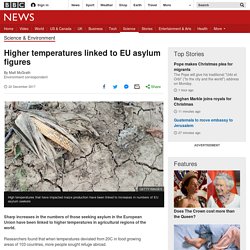
Researchers found that when temperatures deviated from 20C in food growing areas of 103 countries, more people sought refuge abroad. Around 660,000 extra applicants would be expected each year by 2100, the authors say, if current temperature trends continue. The study appears in Science journal. Between 2000 and 2014, around 350,000 people applied for asylum in the European Union every year. Ghana's coastal erosion: The village buried in sand. Bubbles could be a targeted remedy for ocean acidification. Corals, shellfish, and other marine creatures made of calcium carbonate are threatened by ocean acidification, a consequence of rising atmospheric carbon dioxide levels increasing dissolved CO2 in the ocean.
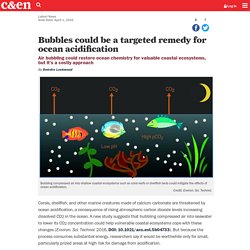
A new study suggests that bubbling compressed air into seawater to lower its CO2 concentration could help vulnerable coastal ecosystems cope with these changes (Environ. Sci. Technol. 2016, DOI: 10.1021/acs.est.5b04733). But because the process consumes substantial energy, researchers say it would be worthwhile only for small, particularly prized areas at high risk for damage from acidification. Like other proposed geoengineering schemes, the approach is being developed as a way to mitigate the harmful effects of CO2 emissions. What are climate change feedback loops? In climate change, a feedback loop is the equivalent of a vicious or virtuous circle – something that accelerates or decelerates a warming trend.
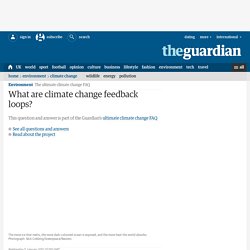
A positive feedback accelerates a temperature rise, whereas a negative feedback decelerates it. Scientists are aware of a number of positive feedbacks loops in the climate system. One example is melting ice. Because ice is light-coloured and reflective, a large proportion of the sunlight that hits it is bounced back to space, which limits the amount of warming it causes. What are climate change feedback loops?
UN climate talks: Hints of compromise on key issue - BBC News. Image copyright Reuters Rich nations at UN climate talks are said to be edging towards a compromise on the thorny issue of loss and damage.
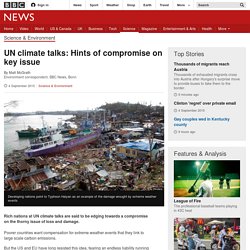
Poorer countries want compensation for extreme weather events that they link to large scale carbon emissions. Growing threat to England's curlews from climate change - BBC News. Much-loved birds including curlews and cuckoos are under a growing threat from climate change in England, according to a new report.
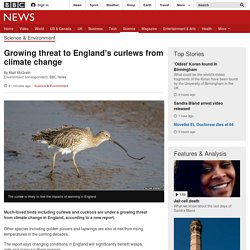
Other species including golden plovers and lapwings are also at risk from rising temperatures in the coming decades. The report says changing conditions in England will significantly benefit wasps, ants and many southern species. The study is said to be the largest of its kind ever undertaken in England. Researchers looked at the impacts of a 2 degrees C rise in global average temperatures on over 3,000 species.
Carbon credits undercut climate change actions says report. The vast majority of carbon credits generated by Russia and Ukraine did not represent cuts in emissions, according to a new study.
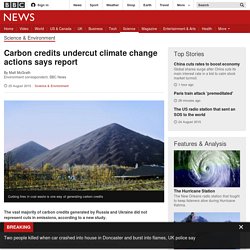
The authors say that offsets created under a UN scheme "significantly undermined" efforts to tackle climate change. The credits may have increased emissions by 600 million tonnes. In some projects, chemicals known to warm the climate were created and then destroyed to claim cash. As a result of political horse trading at UN negotiations on climate change, countries like Russia and the Ukraine were allowed to create carbon credits from activities like curbing coal waste fires, or restricting gas emissions from petroleum production. Arctic ice 'grew by a third' after cool summer in 2013 - BBC News. Carbon Dioxide. Global warming is not driving this refugee crisis, but it may drive the next. There are many causes of the European refugee crisis, but one thing is certain despite headlines to the contrary: Climate change is not the dominant factor.
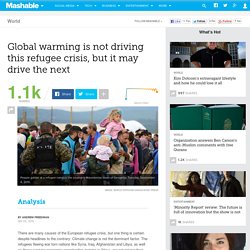
The refugees fleeing war torn nations like Syria, Iraq, Afghanistan and Libya, as well as those seeking economic opportunities lacking in Africa, are not risking their lives along treacherous sea and land routes because of global warming-related factors. News reports calling the refugees the first "climate refugees" are getting too far ahead of the curve. But the ongoing humanitarian disaster provides a teaching opportunity for a time not too long from now when the first true climate refugees trigger a similar situation.
With sea level rise slowly swallowing Pacific island nations and warming sea and air temperatures exacerbating droughts and floods around the world, we're closer than we've ever been to a climate change-triggered migration event. "... Global warming connects to Syria conflict but ... Image: Kelley et al. 2014, PNAS. Paris climate summit: Don't mention Copenhagen - BBC News. Image copyright MADS NISSEN For officials and politicians getting ready for the UN summit on climate change in Paris later this year, there's a word that dare not be uttered: Copenhagen.
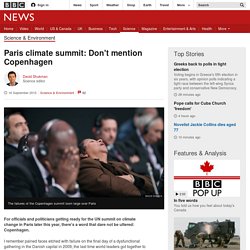
I remember pained faces etched with failure on the final day of a dysfunctional gathering in the Danish capital in 2009, the last time world leaders got together to try to tackle global warming, and the collective memory still haunts the process six years on. So, in the run-up to the next big attempt to secure a global treaty limiting greenhouse gases, it's worth exploring what's changed since 2009 - and what hasn't. In some ways, the negotiating landscape is transformed, mainly because of dramatic shifts by the two biggest emitters, the United States and China.
Syria's Climate Conflict.